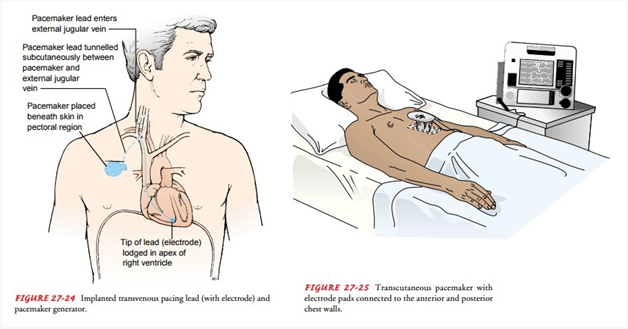The nurse is caring for a client in a hypertensive emergency. Which action will be included in the plan of care during hypertensive emergency who is receiving nifedipine?
Organize nursing activities so that the patient has 8 hours of undisturbed sleep at night.
Use an automated noninvasive blood pressure machine to obtain frequent measurements.
Keep the hypertensive emergency NPO to prevent aspiration caused by nausea and possible vomiting.
Assist the patient up in the chair for meals to avoid complications associated with immobility.
The Correct Answer is B
The action that will be included in the plan of care for a client in a hypertensive emergency receiving nifedipine is to use an automated noninvasive blood pressure machine to obtain frequent measurements.
In a hypertensive emergency, the client's blood pressure is severely elevated, requiring immediate treatment and close monitoring. Nifedipine is a calcium channel blocker commonly used to lower blood pressure in such situations. Continuous blood pressure monitoring is crucial to assess the effectiveness of the medication and ensure that the blood pressure is brought under control safely.
Organize nursing activities so that the patient has 8 hours of undisturbed sleep at night: While providing a conducive environment for sleep is important for overall patient well-being, in a hypertensive emergency, the priority is to manage and monitor the blood pressure. Sleep hygiene may not be the immediate concern in this situation.
Keep the hypertensive emergency NPO to prevent aspiration caused by nausea and possible vomiting: NPO (nothing by mouth) orders are typically implemented when there is a risk of aspiration or pending a procedure requiring anesthesia. In a hypertensive emergency, the focus is on managing blood pressure and ensuring appropriate hydration and nutrition as needed. NPO status may not be necessary unless specifically indicated for the individual patient.
Assist the patient up in the chair for meals to avoid complications associated with immobility: While mobilization and preventing complications associated with immobility are important aspects of care, in a hypertensive emergency, the primary focus is on managing blood pressure and stabilizing the client's condition. Mobilization may be appropriate once the blood pressure is under control and the client's condition permits.
Nursing Test Bank
Naxlex Comprehensive Predictor Exams
Related Questions
Correct Answer is C
Explanation
Enalapril (Vasotec) is an angiotensin-converting enzyme (ACE) inhibitor medication commonly used to treat hypertension. One of the potential side effects of ACE inhibitors is hyperkalemia, which is an elevated level of potassium in the blood. Therefore, it is generally recommended for patients taking ACE inhibitors to avoid excessive intake of high-potassium foods.
The charge nurse should intervene because advising the client to increase their dietary intake of high-potassium foods contradicts the precautions associated with taking enalapril. Consuming high-potassium foods while taking this medication can potentially lead to an increased risk of hyperkalemia, which can have serious health consequences.
Let's review the other statements made by the nurse:
"Make an appointment with the dietitian for teaching": This is an appropriate statement as it encourages the client to seek professional guidance on dietary management of hypertension. A dietitian can provide valuable information on healthy eating habits and strategies to reduce blood pressure.
"Check your blood pressure at home at least once a day": This is also an appropriate statement as it promotes self-monitoring of blood pressure, which is important for clients with hypertension. Regular monitoring helps the client track their progress and detect any changes that may require medical attention.
"Move slowly when moving from lying to sitting to standing": This is a correct statement as it advises the client to practice orthostatic precautions. ACE inhibitors, including enalapril, can cause orthostatic hypotension, a drop in blood pressure upon standing. Moving slowly can help prevent dizziness and falls.
Correct Answer is D
Explanation
Sinus bradycardia with a heart rate of 32 beats/min and accompanying hypotension and symptoms of feeling faint indicates significant hemodynamic compromise. In such cases, the first-line intervention is to provide external cardiac pacing through transcutaneous pacemaker (TCP) pads. TCP can help increase the heart rate and improve cardiac output by delivering electrical impulses to the heart.
Administering the scheduled dose of diltiazem (Cardizem), a calcium channel blocker, is not appropriate in this situation. Diltiazem can further lower the heart rate and blood pressure, exacerbating the client's symptoms and potentially leading to adverse effects.
Repositioning the patient on the left side or having the patient perform the Valsalva maneuver are not effective interventions for treating sinus bradycardia with hemodynamic compromise. These actions may be used in specific situations, but in this case, the client requires immediate intervention to address the low heart rate and blood pressure.

Whether you are a student looking to ace your exams or a practicing nurse seeking to enhance your expertise , our nursing education contents will empower you with the confidence and competence to make a difference in the lives of patients and become a respected leader in the healthcare field.
Visit Naxlex, invest in your future and unlock endless possibilities with our unparalleled nursing education contents today
Report Wrong Answer on the Current Question
Do you disagree with the answer? If yes, what is your expected answer? Explain.
Kindly be descriptive with the issue you are facing.
